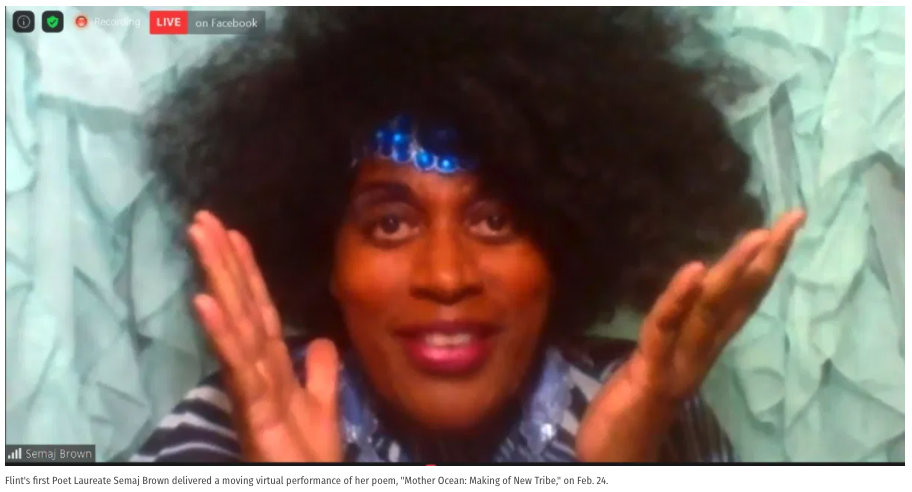
by Amy Diaz | February 27, 2021
Flint, MI– Semaj Brown is not used to performing inside of a box.
She said so on Feb. 24, 2021, during a live poetry reading and discussion over Zoom, with the Woodside Church.
She’s used to the stage, but that didn’t stop her from putting on a theatrical performance of her poem “Mother Ocean,” complete with a light blue ruffle fabric backdrop, blue gems along her forehead, various voices, claps, snaps, and facial expressions.
The poem that involved a dialogue between a “little river girl” and “Mother Ocean” about the resilience, strength, and magic of Black women, was inspired by a photography installation at the Flint Institute of Arts in 2017. Jerry Taliaferro’s exhibit featured black and white portraits of Black women making a positive impact on the Flint community. Brown, who went on to be named Flint’s first poet laureate two years later, was one of them.
She’s been called a prophet, and a guru, although she said those titles make her uncomfortable. She prefers “griot,” a West African term for a person who is the keeper of stories, history, and truth.
The poem Brown read, part of her book “Bleeding Fire! Tap the Eternal Spring of Regenerative Light,” describes the struggle of Black women but their strength in spite of it all to continue on.
“My daughter’s brains, their brains are incredible, masterful cerebral filtering systems,” Brown said in Mother Ocean’s voice. “Always filtering faith from fear, hope from horror, triumph from trauma.”
She calls it spirit, grit, ancestral angel fire, and Black girl magic. She also calls it survival.
Brown paints a picture of all of the places Black women are standing– in boardrooms, in courtrooms, in hospitals, in science, in uniform, in shelters, in churches, in poverty, in street corners.
“Say her name,” Brown repeated over and over : Sandra Bland, Breonna Taylor, Oprah, Michelle Obama, Ava DuVernay, Harriet Tubman, 100,000 Flint residents.
The little river girl asks Mother Ocean how long it took for her daughters to be made whole. Mother Ocean replies, that “they were complete in the beginning, throughout, and remain whole today.”
Brown spoke about this line in the discussion after the reading. Pastor Deb Conrad asked about the concept of being made whole in the material or legal sense– like reparations, and returning what was stolen.
Brown explained that it’s not the Black women who need to be made whole. The true broken people, she said, are the ones inflicting violence and oppression, and upholding racism.
“It made me think about a man that beats his wife continuously. Every night he brutalizes her and then she is sent for anger management,” Brown said. “Who’s broken in that picture? Is she broken? Is she un-whole? Or is it the man, that is doing the merciless beating?”
Brown said she believes the lens needs to be taken off African American people as being “unhealed” and “needing to heal.”
“How can you heal if you are constantly being assaulted? How can that happen? It can’t,” she said. “It’s not us that need to be healed, it’s the people who are broken. Something’s wrong with them, that they would engage in this kind of system of destruction persistent over hundreds of years.”
This poem came to Brown as a rumbling, a feeling, she said.
She hadn’t written anything for a while. She was busy listening. But after seeing this art installation “The Women of a New Tribe,” she was inspired.
Brown called up her cousin, Linda, and told her a poem was coming, one that would be “our story.” Linda told her to get writing, and that she would call her in two hours to check on her.
“And the reason why she said that is because I didn’t want to write this piece and end up at the bottom of the ocean in grief,” Brown said. “I wanted to survive the writing. So I prayed before I went to sleep that I would be able to not feel all of this misery and have it in my body.”
The next morning, she woke up and wrote like a scribe, she said.
The poem was inspired by the women in the portraits, but also the deity in West African classical spirituality called “Mami Wata” or Mammy Waters.
“So the women are oceans…I am an ocean. I am a walking, talking river,” Brown said. “…Water is spirit and spirit remembers. If we only knew and understood the reason why we go to the river. We go to the river to see ourselves, to return to who we are, to try to see, because our memories have been stolen.”
To watch the poetry reading and discussion, you can visit Brown’s website here.

